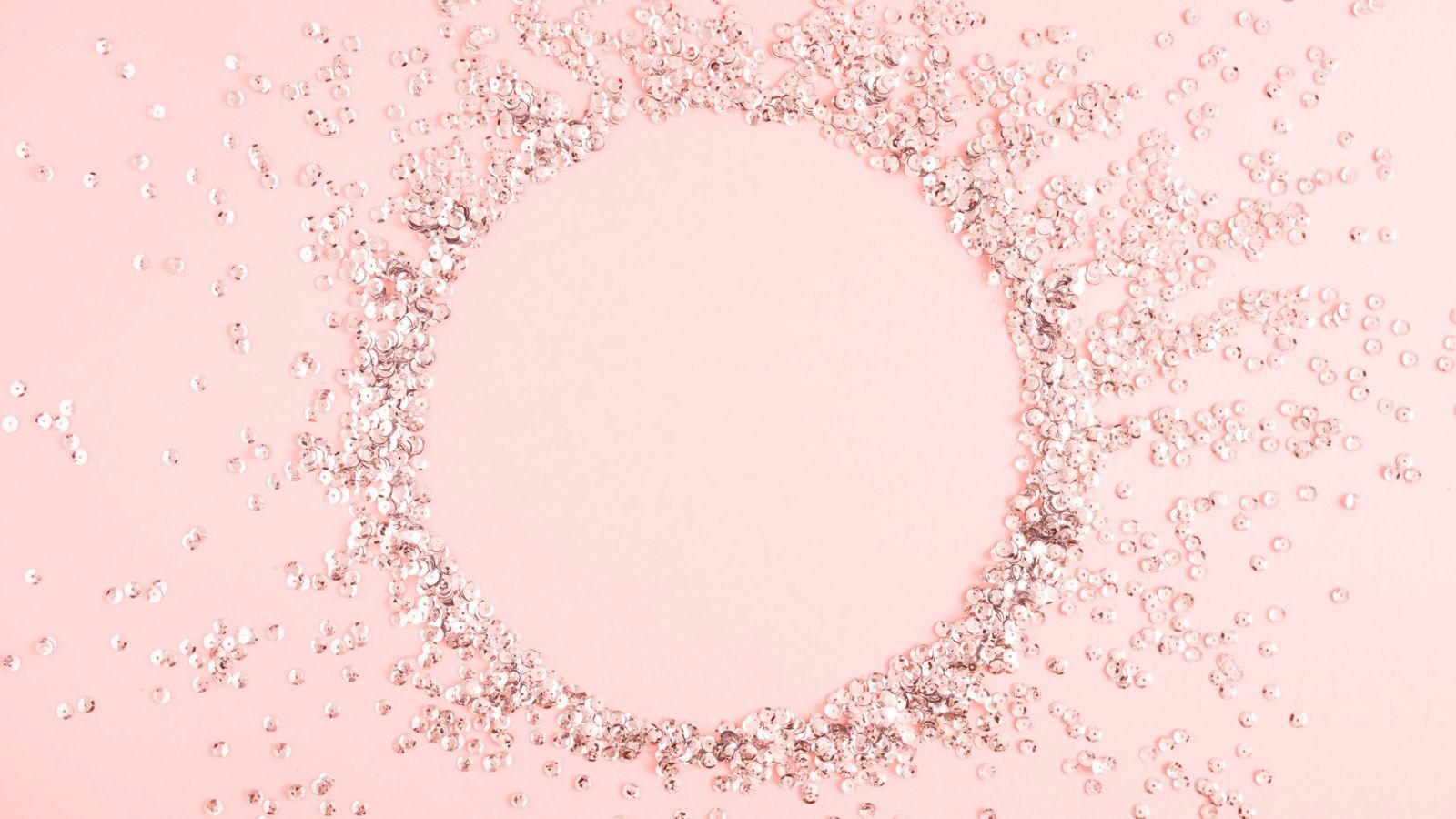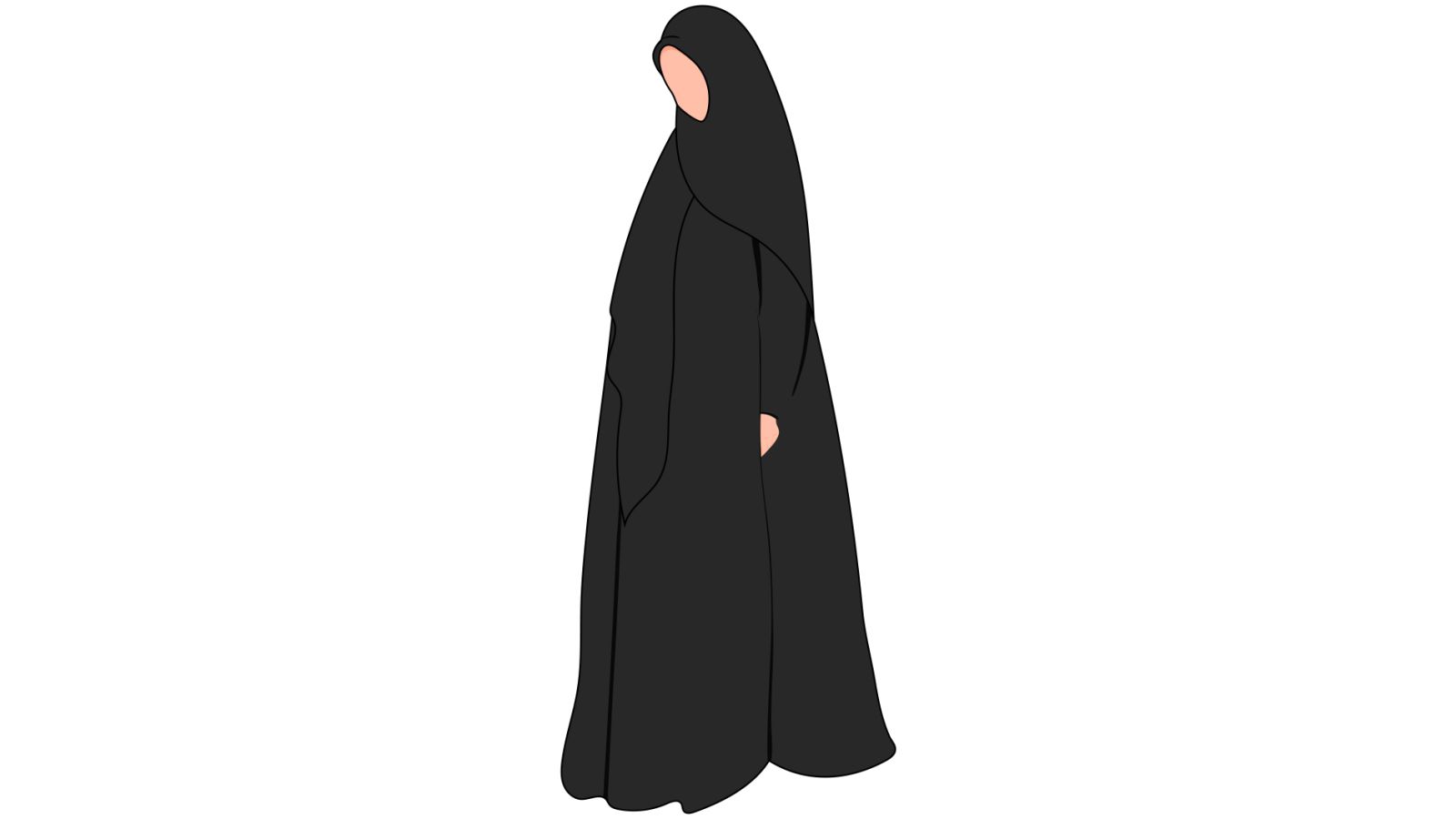

Ever since the appearance of ḥijāb in the West, there has been a constant crusade against this noble act.
Amidst the hustle and bustle of a teeming metropolis, a solitary figure traverses. She moves steadily in her black garment which shields her against the tyranny of this life. Whilst others around her rush frantically, she moves with tranquillity and ease. The peace which she achieves beneath this veil of hers is immense. It is liberation beyond measure. Is this a princess of royal blood? No. Is she a head of state? No. So who is this woman of serenity? This is a woman of ḥijāb. A woman amongst many women. A Muslim Woman.
The site of a woman covered from top to bottom is not so rare anymore in the major cities of the West. For many Westerners, it represents the oppression which Islām imposes upon women. For Muslims however, it is the realisation that Islām will eventually reach every corner of this planet. This is not surprising, considering that Islām is the fastest-growing religion on Earth. What is surprising, for Westerners, is that 7 out of 10 (70%) people who become Muslim are Women! It is these same women who then go on to willingly observe the ḥijāb without coercion or force. The women of ḥijāb in the cities of London, Paris, New York etc, are not all immigrants who have just stepped off the boat, as many people think. Rather, many of them tend to be women of high intellect and education. Women who have experienced the bitterness of western oppression. Women of diverse nationalities and races are brought together as one, under the banner of Islām.
An Islamic Duty
Ever since the appearance of ḥijāb in the West, there has been a constant crusade against this noble act. The hypocrisy1 of the Western media has been evident for many years now, through its constant attacks on Islām and ḥijāb. Despite these attempts, women in ḥijāb are still on the increase. Thus, a new crusade had to be launched by the advocates of “liberation” and “freedom”. For a while now, many Western critics have insisted that the Ḥijāb has nothing to do with Islām. They claim that it is a cultural practice and not a religious one. This has been broadcast in the Western media with the aid of its puppets, the modernist Muslims. People such as Dr Zaki Badawi2, have pushed this erroneous view for a number of years now. This has led to much confusion amongst ignorant Muslims, and many Muslim women are being led into depriving themselves of this great benefit. So what is the reality behind this issue? Is the Ḥijāb obligatory?
ḥijāb is an Arabic word which literally means a cover, a screen or a partition. Islamically it refers to the dress code of the Muslim woman. In answering the above question, as Muslims, we unashamedly say, Yes!, the ḥijāb is obligatory!! The proofs for this obligation are many, but due to lack of space, we will only quote two here. In the Qur’an Allāh says:
“And tell the believing women to lower their gaze and guard their modesty, and not to display their adornment except that which appears ordinarily thereof, and to draw their veils over their necks and bosoms..”
[Sūrah An-Nūr 24:31]
About the words “..except that which appears ordinarily thereof..”, then the scholars of Islām have explained that these words refer to the hands and face of a woman. This is supported by the Ḥadīth of the Prophet (ﷺ): “Āʿishah reported that Asmāʾa, the daughter of Abū Bakr, entered into the presence of the Messenger of Allāh wearing thin transparent clothing, So the Messenger of Allāh turned away from her saying: ‘O’ Asmāʾa, when women reach the age of menstruation, it is not allowed that any of her should be seen except this’ – and he pointed to his face and two hands.”3 The ḥijāb is therefore something which must cover the entire body of a woman, except her face and hands.4 It is not a simple headscarf that many women wear, because a piece of cloth on the head does not conceal the parts of a woman’s body, which when exposed, are the result of much strife. Besides covering the entire body, the Ḥijāb also has other conditions, such as not being tight, transparent, too colourful or resembling the clothes of a man. These conditions are also proven by Islām.5
The Benefits of Ḥijāb
Whilst other women are subjected to the pressures and slavery of modern society, the Muslim woman is truly free from this. In the west, women are expected to conform to the liberal fashions which appear daily. These fashions and expectations are often shaped by men. In this way, women become the slaves of society and men. Ḥijāb is the liberator of this slavery. It takes women away from the obedience of man, to the obedience of the Most Perfect, Allāh. This obedience will only bring about good because we believe that Allāh is the Most Kind and the Most Just. Slavery to the one with such characteristics is slavery of reward and contentment. It is not slavery from which your fellow human (the woman) is exploited and oppressed, just because your desires and lusts run wild.
As a command of Allāh, the ḥijāb has united the hearts of so many. Ḥijāb knows no colour, nationality, race, height or weight. Through obedience to Allāh, it truly unites the women of the world. Thus, this unification has surpassed the ranks and shallowness of all female liberation movements. Christian nuns, Jews, Hindus, Sikhs, feminists, lesbians, women boxers and even female gang members, are all known to have become united under Islām and its ḥijāb. It is truly a force to be reckoned with. It must be remembered that this obedience to Allāh is a voluntary act from most Muslim women. Many assume that those brought up as Muslims, have always been wearing ḥijāb. However, this is not so. Many Muslim women (especially in the UK), who are Muslim by name, often know very little of Islām. When they discover its true meaning, most of them willingly adopt the ḥijāb simply to obey their Creator and not because of any external pressures.
Wearing the ḥijāb is no futile action. A woman may go through much trial and tribulation6 because she has obeyed Allāh. But the fulfilment of this action will never go unnoticed, as Allāh says:
“Never will I allow to be lost the actions of any of you; whether male or female”
[Sūrah Al-Imrān 3:195]
The result of these obedient actions will be an everlasting reward. A reward which all Muslim women aspire for. A reward called Paradise :
“And whosoever does righteous actions- whether male or female, and is a believer, will enter Paradise”
[Sūrah Al-Nisāʾ 4:124]
Allāh says :
“O’ Prophet! Tell your wives and your daughters and the women of the believers to draw their veils over their bodies. That is most convenient that they should be recognised and not be molested”
[Sūrah Al-Aḥzāb 33:59]
One of the greatest benefits of ḥijāb, is the natural protection it gives to a woman. By wearing ḥijāb, a woman shields herself from the rampant desires of man. By his very nature, man is a creature of intense desire. The ḥijāb controls this desire and thus not only protects the woman, but also the man. Sexually motivated crimes in the west are on the increase. Rape, molestation and harassment are reaching epidemic levels. Undoubtedly the clothing of a woman has something to do with this. When women walk around with literally nothing on, some men see it as a signal to do as they please. This results in the honour of a woman being scarred for life. The Muslim woman does not have this problem. She knows that when she walks on the streets, the men will not look at her. Why? Because there is nothing for them to look at!! She feels like a princess who is shielded from the savages of her domain. Peace and security is felt beneath the veil. The woman of ḥijāb does not have to reveal her body in order to gain respect. She does not have to have her ‘bits’ hanging out so that men can drool over her. If a man desires her, then it has to be for her religion and intellect. The ḥijāb gives him no other choice. She is a woman who is truly shielded from the nature of man.7
The nature of a woman is fundamentally different from man. Women are more timid, gentle and caring than men. This is the reason why they have been chosen (by Allāh) to be the perfect rearers of children. The ḥijāb reinforces this nature of the woman. We praise Allāh that he has ordered this ḥijāb, for the world that we live in seeks to change our very nature as human beings. Men try to be women and women try to be men. People are being led into confusion by the political correctness which is so popular in our societies. Many women have jumped onto the bandwagon of feminism and lesbianism, shouting how evil and oppressive men are. But when one looks at these sad creatures, their delusion is clear. While claiming to hate men, their attire suggests otherwise. Short hair, bomber jackets and steel-toe-capped boots are the vogue for these women. Their hatred for men is so much that their very appearance resembles the enemy!! Some of these women have even gone to the extreme of growing masses of facial hair. The hideous site of these bearded ladies is enough to put anyone off their dinner!!! Such depravity is far from natural. The ḥijāb on the other hand enables the woman to stay as a woman. Rather than being a monstrosity, a woman in ḥijāb is like an oyster with a beautiful pearl inside it. Her femininity has stayed feminine, without being altered into masculinity. There is no doubt about it, this is a true woman.
Those who seek to reject ḥijāb after reading this, then their loss will eventually become apparent. But those who seek to please Allāh through this action can be sure that this good can only bring more good:
Contrary to the tales of the media, the ḥijāb provides an honour for the woman like no other garment does. For many women, a dress designed by Versace8 or Armani is all the honour they need. But the ḥijāb carries far more honour than these worthless clothes. Whilst the dresses of the catwalks are designed by mere mortals, the ḥijāb comes from the one who is immortal, Allāh. Through it, a woman is held with the utmost respect. True Muslim men are obliged to keep their Muslim sisters away from the corruption of this world. Thus, a Muslim will not allow someone to ogle his wife, chat her up or harass her. The honour of a Muslim woman demands that this does not happen. How contrary this is to live in the West. Men in the West feel no obligation to protect women from the harms of society. This is why a man will allow his wife to be a stripper, call girl and even a prostitute. Honour knows no place in the West. This honour will only be achieved from Islām and its ḥijāb.
The honour of a Muslim woman is so high, that we believe that the state of a society is dependent upon its women. If women are corrupt and immoral, then society will be corrupt and immoral. If the women are righteous and god-fearing, then society will be righteous and god-fearing. Women are the educators of the nation. But if they have no honour and have been corrupted, then society will be void of education and steeped in ignorance. This is the predicament of a society which rejects ḥijāb. This is the predicament of all Western societies, which stubbornly cling to their depressing ways of life.
Those who seek to reject ḥijāb after reading this, then their loss will eventually become apparent. But those who seek to please Allāh through this action can be sure that this good can only bring more good:
“Is there any reward for good – other than goodness?”
[Sūrah al-Raḥmān 55:60]
Endnotes:
1. The British media is an example of this. Whilst condemning the ḥijāb as oppressive, it is well known that newspapers such as The Sun and The News of the World, often display pictures of naked women. This, of course, is the liberation that the West claims to give women!
2. Dr Zaki Badawi is a self-styled mufti who is unfortunately seen as a public face of Islām. A number of years ago, Dr. Badawi appeared on Dutch T.V. proclaiming that ḥijāb was not obligatory. This announcement caused much confusion and resulted in some women taking their ḥijāb off.
3. Authentic – Reported by al-Bayḥaqī.
4. Even though it is not obligatory to cover the face and hands, it is, without a doubt, recommended that the niqāb (the face veil) and/or gloves be worn. Such acts are seen as modesty and piety from the woman, and they can only bring her more reward.
5. The proofs for these conditions can be found in an excellent book entitled “The Islamic ruling regarding Women’s dress, according to the Qur’an and Sunnah” by Abū Bilāl Mustafa Al-Kanadi.
6. Wearing ḥijāb in the West can be a struggle for many women. The hypocrisy of the West is such that it does not respect this choice which is made willingly, and subjects these women to much psychological pressure. 2 years ago, two Muslim girls were even expelled from a school in France because they wore ḥijāb. Freedom has truly been given a new meaning!
7. “A view through ḥijāb” is an informative account of life in ḥijāb. Written by Khaula Nakata, it is the experience of ḥijāb as seen through the eyes of a Japanese woman who embraced Islām.
8. There will be no more dresses designed by Gianni Versace!! The evils of Homosexuality ensured that this man (?) reaped the fruits of his unholy labour.
[Article taken from ‘Invitation to Islām’ newsletter, September 1997]

















